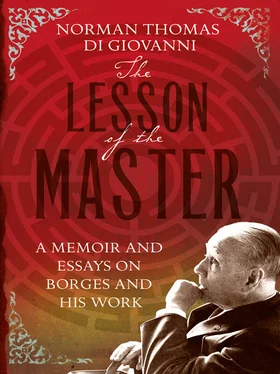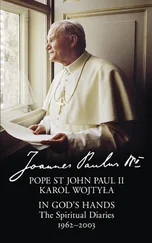‘Borges,’ I’d quip when the mood came over me, ‘I can see from here that that sheaf you’re putting your John Hancock to grants the whole library staff an extra two-week holiday with pay.’
And he would do a comic double-take, feigning astonishment, stop scribbling, look up trying to locate the secretary’s face, and repeat to her my remark in Spanish.
‘No, jamás nunca, Señor Borges; le juro.’ And with her oaths to the contrary and not-on-your-lifes, he let himself be readily convinced every time.
This is not to suggest that Borges did not take the job in earnest. He did. But at the same time he knew he was a figurehead – a mere figurehead, he would have phrased it – and, never pompous about anything, he allowed himself to be ironic about the post. Deep down, he was proud of the library, of the position, and grateful for it too. Almost in the manner of a credulous child, he would recite for visitors that the library contained 800,000 volumes. Or later, 900,000. It was one of the few facts Borges ever had at his fingertips. To him facts were the antithesis of the essence of truth, and he found them meaningless. This was the only fact I can remember his spouting that required – unlike the year of his birth, say – frequent updating. The job was the perfect symbol for him, and he was the perfect symbol for the job. Indeed, what library in the world would not have rejoiced at having a Borges as its titular head? He performed the office like a master – as if he had been born to it, or, better, because he had been born to it.
Those evenings of ours were devoted to the translation of stories, poems, and essays of his into English. ‘My afternoons now are usually given over to a long-range and cherished project,’ Borges was to write a year later, when he was seventy-one. ‘For nearly the past three years, I have been lucky to have my own translator at my side, and together we are bringing out some ten or twelve volumes of my work in English, a language I am unworthy to handle, a language I often wish had been my birthright.’
As the young man from Siete Días or Gente knew, all this made a good story: the American from Boston who had suddenly popped up and was shepherding the legendary Borges along the streets of Buenos Aires and working with him at the National Library. In fact, the story had a bit of everything – the exotic and the homely. Here was the lofty National Treasure, for whom New York publishers were competing, whom they had sent one of their own to the ends of the earth to watch over. It proved Borges really was a world figure and not just an oddball local, an Anglophile with a passion for books; it meant that Buenos Aires and Argentina counted in the world for something more than excellent steaks and crack football players. It was a fine tonic for the constant doubt about his identity that assails the porteño at the best of times. These were not the best of times. ‘Nationalism is creeping in all the time,’ Borges sneered. It was the military dictatorship of General Onganía; soon grim-faced Federal police, more of them every week, would be appearing on street corners wearing jack-boots and wielding stubby submachine guns; soon the faithful flock would be bleating for the return of Perón. With the horizon fast shading from leaden to black, enter the young American in the tweed suit who had something in common with half the population of Buenos Aires – a comforting Italian surname. Which was why the story was about me, why the pictures were of me with the National Treasure on my arm and not of Borges with me on his.
I often joked with him about this. As we moved through Florida Street, a pedestrian precinct on the way to his mother’s, people would open a way, turn round, gape, point. ‘It never ceases to amaze me the way strangers seem to recognize me,’ I would tell him, deadpan. ‘“Look,” they say, “there’s di Giovanni – there, with the old man on his arm.”’ It made Borges laugh every time. The passers-by never failed to greet him; some even held their children up for him to touch. He always asked people their names, where they were from. Ah, yes. He had a friend there. A lawyer and a fine poet named Fernández Ordóñez. Borges was a living monument, and the Argentines revered him.
At the library we shuffled through the revolving door and up the grand marble staircase, entering first the outer office with the scruffy, bare, wooden floor, where the secretaries huddled at a tiny table in the corner by the window. Except by that window, the room was lightless, bleak, and spartan. A small wire wastebasket stood beside the table. There was one telephone – big, clumsy, black, its cord frayed. It didn’t matter. The phones, like the secretaries, only worked part-time. The building dated from 1901 and had been, as Borges was fond of telling visitors, the seat of the national lottery. The inner sanctum, Borges’s office, had an extraordinarily high ceiling, green wallpaper printed with bamboo-like fronds, polished mahogany panelling, and a parquet floor. We worked at the old-fashioned conference table in the centre of the room. At the far end was the desk that Paul Groussac, a distinguished predecessor, had had built to his own design. It was U-shaped. If you sat behind it, as Borges never did, it surrounded you. It had strange drawers and odd compartments. Borges later described it briefly at the end of his story ‘There Are More Things’.
The room’s other furnishings were a couple of revolving bookshelves and a tall set of drawers into which Borges slipped the drafts of poems he dictated in the morning to a secretary. Two pairs of doors led off the room straight onto a corridor. These we used only when trying to give the slip to someone who might be waiting in the outer office or when we went to the vast, stark loo that was used only by us. Next door was the room Groussac had died in, a detail Borges took ghoulish delight in recounting. For once upon a time the director had lived on the premises. There were traces of a kitchen that proved it. But Elsa, the new Mrs Borges, whom Borges had married at sixty-eight (she was some ten or twelve years younger), would have none of it. She was right, of course. The library was a gloomy place, and I thought I too would go blind there. There was a dictionary of the Spanish Royal Academy, whose paper and binding Borges and I were fond of smelling, on the main table. The one place in all Buenos Aires where my tweed suit was no match for the winter was in the dank cavern of Borges’s office. But there was a large, ornate fireplace at my back, where a fire of eucalyptus logs would glow – not burn but glow. If I backed up to it now and again, the icy chill was momentarily dispelled. Still, one was thankful for small mercies.
What the photographs in the magazine article do not show is the crablike walk I had developed, much to the detriment of my lower back muscles. Buenos Aires pavements are narrow, and to negotiate them with Borges on my right arm I had to learn to master the art of walking with my left hip and left arm leading the way. To make matters worse, my extended left hand always carried a briefcase bulging with papers and books. There I was with the National Treasure on my arm, keeping him safe from the murderous traffic, the ubiquitous excavations, and the broken tiles of the city’s pavements, steering him round open pits or dodging beau traps. And all the while the squat buses inched along in step with us, throbbing and belching thick black exhaust over the Treasure; over my herringbone tweed; over his monologue about Victoria Ocampo, whom he dubbed Queen Victoria for her imperial ways, or Ernesto Sabato, dubbed the Dostoyevsky of Santos Lugares for his bouts of melancholia; over an example of the word music of Dunbar, Coleridge, or the Bard himself, whose ‘multitudinous seas incarnadine’, capped with ‘making the green one red’, never failed to rouse and thrill Borges – potholes, pitfalls, grime, soot, lethal traffic, and sputtering buses be damned.
Читать дальше












